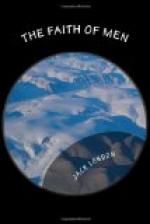But it was at his next halt that the mystery of the smoke was explained. With the word at Big Salmon that the trail was broken to Pelly, there was no longer any need for the smoke wreath to linger in his wake; and Rasmunsen, crouching over lonely fire, saw a motley string of sleds go by. First came the courier and the half-breed who had hauled him out from Bennett; then mail-carriers for Circle City, two sleds of them, and a mixed following of ingoing Klondikers. Dogs and men were fresh and fat, while Rasmunsen and his brutes were jaded and worn down to the skin and bone. They of the smoke wreath had travelled one day in three, resting and reserving their strength for the dash to come when broken trail was met with; while each day he had plunged and floundered forward, breaking the spirit of his dogs and robbing them of their mettle.
As for himself, he was unbreakable. They thanked him kindly for his efforts in their behalf, those fat, fresh men,—thanked him kindly, with broad grins and ribald laughter; and now, when he understood, he made no answer. Nor did he cherish silent bitterness. It was immaterial. The idea—the fact behind the idea—was not changed. Here he was and his thousand dozen; there was Dawson; the problem was unaltered.
At the Little Salmon, being short of dog food, the dogs got into his grub, and from there to Selkirk he lived on beans—coarse, brown beans, big beans, grossly nutritive, which griped his stomach and doubled him up at two-hour intervals. But the Factor at Selkirk had a notice on the door of the Post to the effect that no steamer had been up the Yukon for two years, and in consequence grub was beyond price. He offered to swap flour, however, at the rate of a cupful of each egg, but Rasmunsen shook his head and hit the trail. Below the Post he managed to buy frozen horse hide for the dogs, the horses having been slain by the Chilkat cattle men, and the scraps and offal preserved by the Indians. He tackled the hide himself, but the hair worked into the bean sores of his mouth, and was beyond endurance.
Here at Selkirk he met the forerunners of the hungry exodus of Dawson, and from there on they crept over the trail, a dismal throng. “No grub!” was the song they sang. “No grub, and had to go.” “Everybody holding candles for a rise in the spring.” “Flour dollar ’n a half a pound, and no sellers.”
“Eggs?” one of them answered. “Dollar apiece, but there ain’t none.”
Rasmunsen made a rapid calculation. “Twelve thousand dollars,” he said aloud.
“Hey?” the man asked.
“Nothing,” he answered, and mushed the dogs along.




